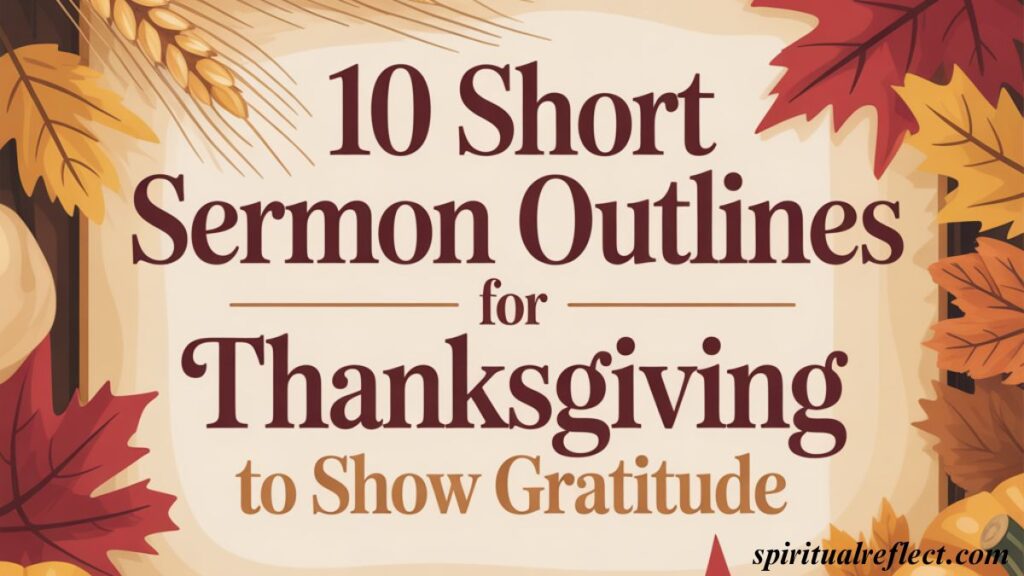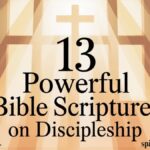Short Sermon Outlines for Thanksgiving to Show Gratitude are simple, structured messages that help pastors and believers share powerful truths about thankfulness. These outlines include key Bible verses, clear themes, and practical applications that inspire hearts to praise God. They’re designed to make preaching easier, focusing every word on expressing genuine gratitude and recognizing God’s goodness in everyday life.
Thanksgiving is more than a holiday; it’s a heartfelt celebration of grace, faith, and contentment. Through uplifting sermons, congregations can reconnect with the true meaning of thankfulness—acknowledging blessings, remembering God’s faithfulness, and expressing joy in worship. A well-crafted outline turns each message into a moment of spiritual renewal and unity.
Using Short Sermon Outlines for Thanksgiving to Show Gratitude helps pastors communicate life-changing lessons with clarity and warmth. Each outline serves as a guide to cultivate thankful hearts, strengthen faith, and encourage believers to live every day with praise and gratitude.
1. A Grateful Heart Honors God
Theme: True thanksgiving flows from the heart, honoring God in all we do.
Key Verse: Psalm 9:1 – “I will give thanks to you, LORD, with my whole heart; I will recount all your wonderful deeds.”
Core Message: When our heart is truly grateful, we turn our focus from self to God; thanksgiving becomes more than words—it becomes worship.
Sermon Points:
- A grateful heart acknowledges God’s goodness.
- It draws us closer to Him by remembering His deeds.
- It reshapes our vision, so our hearts become full of trust and praise rather than complaint.
Practical Application: Encourage the congregation to start a gratitude list this week—each day note one specific act of God’s grace or provision.
Closing Thought/Prayer: “Lord, give me a heart that sees, remembers, and thanks You—may my whole heart give thanks to You.”
2. Counting Every Blessing, Big and Small
Theme: Gratitude deepens when we notice the little things.
Key Verse: 1 Thessalonians 5:18 – “Give thanks in all circumstances; for this is the will of God in Christ Jesus for you.”
Core Message: God’s provision isn’t limited to big, obvious blessings; when we learn to count both the major and minor gifts, we live in a spirit of continual thanksgiving.
Sermon Points:
- Gratitude begins with awareness of what God is doing.
- The small blessings often point us back to God’s faithfulness.
- Consistently counting blessings builds lasting joy and keeps us from entitlement.
Practical Application: Challenge people to list five small blessings today (a warm meal, a helping hand, laughter with a friend) and thank God for each.
Closing Thought/Prayer: “Father, help me to see the everyday blessings You give, so my heart cultivates thankfulness and contentment.”
3. Giving Thanks in All Circumstances
Theme: Thanksgiving is a choice, not just a response to good times.
Key Verse: Philippians 4:11-12 – Paul explains he learned to be content in every circumstance.
Core Message: Even when life is hard, a heart of gratitude demonstrates faith in God’s sovereign plan and brings peace.
Sermon Points:
- Thanksgiving in trials reveals deeper trust in God.
- Gratitude in difficulty changes our perspective—we see not just suffering but purpose.
- A thankful heart in harsh times leads to peace and spiritual maturity.
Practical Application: Invite attendees to recall one difficult season in life and identify at least one thing they can still thank God for—even if it’s the growth rather than the comfort.
Closing Thought/Prayer: “Lord, give me strength to thank You not only for the good days but for the growth You bring in the storms.”
4. Gratitude: The Gateway to Joy
Theme: A thankful heart unlocks joy in the Christian life.
Key Verse: Psalm 100:4 – “Enter his gates with thanksgiving, and his courts with praise! Give thanks to him; bless his name!”
Core Message: When gratitude becomes our posture, joy naturally follows—because joy flows from recognizing God’s goodness.
Sermon Points:
- Gratitude and joy are intertwined—one feeds the other.
- A mind of thankfulness transforms our inner atmosphere (from complaining to celebrating).
- Joyful living becomes a witness to others as we live out a thankful spirit.
Practical Application: Ask the congregation to find today’s simple “thankful moment” (for example: a friend’s kindness) and share it with someone else this week.
Closing Thought/Prayer: “Dear God, open my eyes to Your daily goodness, so joy becomes the rhythm of my life.”
5. The Power of a Thankful Spirit
Theme: Living with a thankful spirit changes us and impacts others.
Key Verse: Colossians 3:15 – “And let the peace of Christ rule in your hearts, to which indeed you were called in one body. And be thankful.”
Core Message: A spirit of thankfulness unlocks God’s peace and strengthens our Christian witness—gratitude isn’t just personal, it’s communal.
Sermon Points:
- A thankful spirit cultivates peace in our hearts.
- It influences how we relate to others—grateful people uplift those around them.
- It reflects the character of Christ in everyday relationships and decisions.
Practical Application: Encourage people to write a short “thank you” note to someone in church who blessed them—gratitude out loud transforms relationships.
Closing Thought/Prayer: “Jesus, fill me with a thankful spirit that brings Your peace into my heart and my community.”
6. Bless the Lord, O My Soul
Theme: Thanksgiving is worship in action—not just words, but the life behind them.
Key Verse: Psalm 103:1-2 – “Praise the LORD, my soul; all my inmost being, praise his holy name. Praise the LORD, my soul, and forget not all his benefits.”
Core Message: True worship springs from remembering God’s benefits and responding with genuine gratitude—our souls join the chorus of heaven.
Sermon Points:
- Remembering God’s benefits leads to wholehearted praise.
- Worship flows when we don’t forget what God has done.
- A thankful life becomes ongoing praise, not a seasonal jog.
Practical Application: Offer a moment of guided reflection in the service: invite people to silently list three specific things God has done for them and then praise Him in prayer.
Closing Thought/Prayer: “O Lord, may my soul bless You not only today but in every breath, remembering and declaring Your goodness.”
7. Thankfulness as Worship: A Heart Turned Toward God
Theme: Gratitude isn’t just a response—it’s a deliberate act of worship.
Key Verse: Romans 12:1 – “Therefore I urge you, brothers and sisters… offer your bodies as a living sacrifice, holy and pleasing to God—this is your spiritual act of worship.”
Core Message: When we live with a thankful heart, our entire life becomes a sacrifice of worship—gratitude shifts from vertical (to God) into horizontal (to others) and back.
Sermon Points:
- Worship extends beyond singing—it’s a thankful lifestyle.
- Gratitude expresses surrender to God’s will.
- A heart turned toward God invites His presence in ordinary life.
Practical Application: Challenge the congregation to identify one daily habit next week (meal time, commute, bedtime) in which they will spend one minute explicitly thanking God, thereby transforming that moment into worship.
Closing Thought/Prayer: “Father, let my life be a living sacrifice of worship—thankful in every moment, turned toward You.”
8. Overflowing with Gratitude for God’s Goodness
Theme: Deep gratitude doesn’t stay contained—it overflows into every area of life.
Key Verse: Colossians 2:6-7 – “As you therefore have received Christ Jesus the Lord, so walk in him… being built up in him and established in the faith, just as you were taught, abounding in thanksgiving.”
Core Message: As we root our lives in faith in Christ, gratitude becomes natural and abundant—it spills outward, touching others, transforming our world.
Sermon Points:
- Spiritual growth in Christ leads to abounding thanksgiving.
- An overflowing heart of gratitude impacts how we serve and love others.
- Thankfulness becomes a lifestyle, not just a moment.
Practical Application: Invite participants to pick one service opportunity this week (helping a neighbor, volunteering) as a practical outlet for their gratitude.
Closing Thought/Prayer: “Lord Jesus, build me up in You so that my gratitude overflows—touching people, praising You, and pointing others to Your goodness.”
9. A Season for Thanks, A Lifetime of Praise
Theme: While we often focus on the Thanksgiving seasonally, true thanksgiving stretches into every day.
Key Verse: Psalm 145:2 – “Every day I will bless you and praise your name forever and ever.”
Core Message: Gratitude isn’t confined to one day—it’s a rhythm of life. When we commit to daily thanks, we live in continuous praise and contentment.
Sermon Points:
- Gratitude is a discipline, not just an emotion.
- A lifelong attitude of thankfulness resets our perspective on what matters.
- Praise becomes our habit, and contentment our companion.
Practical Application: Suggest a “thankfulness challenge” for the next 30 days—each morning, write one thing you will thank God for and one way you will show that thanks today.
Closing Thought/Prayer: “Holy Spirit, teach me to live in a rhythm of thanks—not just at Thanksgiving, but every day, every breath.”
10. Remembering God’s Faithfulness with Grateful Hearts
Theme: Our gratitude grows when we remember how faithful God has been in the past.
Key Verse: Deuteronomy 8:10-11 – “When you have eaten and are satisfied, praise the LORD your God for the good land he has given you… Be careful that you do not forget the LORD your God.”
Core Message: Memory fuels thanksgiving. When we remember God’s faithfulness—His grace, provision, mercy—we anchor our hearts in hope and gratitude.
Sermon Points:
- Forgetfulness weakens our faith; remembering strengthens it.
- Recalling God’s past work builds trust for the present and future.
- A heart that remembers cultivates hope and thanksgiving even before the blessing arrives.
Practical Application: Ask people to write a “Faithfulness Timeline” of 3 to 5 significant moments where God showed up in their lives—then share one with a partner or small group this week.
Closing Thought/Prayer: “God of my past and my future, thank You for Your faithfulness. Help me never forget what You have done, so I may live in gratitude and hope.”
How to Use These Sermon Outlines
- For Pastors: Use each outline as a quick-to-adapt message for a Thanksgiving service or mid-week devotional. The structure gives themes, verses, points, and applications so you’re ready to preach.
- For Small Groups: Each outline can serve as a discussion starter. Ask group members to pick one point, reflect, share personal testimony, and commit to application together.
- For Personal Devotions: You could turn the set into a 10-day devotional guide—one outline per day—letting your heart soak in the themes of gratitude, praise, and worship.
- Visual Aid Suggestion: Include a downloadable table that compares all ten sermon outlines at a glance (theme, key verse, three points, application). That helps plan and pick quickly.
Comparison Table
| Sermon # | Theme | Key Verse | One-Line Application |
|---|---|---|---|
| 1 | Grateful Heart Honors God | Psalm 9:1 | Start a gratitude list. |
| 2 | Counting Every Blessing | 1 Thess 5:18 | List five small blessings today. |
| 3 | Giving Thanks in All Circumstances | Philippians 4:11-12 | Identify growth from a challenge. |
| 4 | Gratitude = Gateway to Joy | Psalm 100:4 | Share a “thankful moment” this week. |
| 5 | Power of a Thankful Spirit | Colossians 3:15 | Write a note of thanks to someone. |
| 6 | Bless the Lord, O My Soul | Psalm 103:1-2 | Meditate on God’s benefits. |
| 7 | Thankfulness as Worship | Romans 12:1 | Transform one routine into a worship moment. |
| 8 | Overflowing with Gratitude | Colossians 2:6-7 | Serve someone out of thanks. |
| 9 | A Lifetime of Praise | Psalm 145:2 | Begin a 30-day thankfulness journal. |
| 10 | Remembering God’s Faithfulness | Deuteronomy 8:10-11 | Create a personal “Faithfulness Timeline”. |
Conclusion
Short Sermon Outlines for Thanksgiving to Show Gratitude remind us that true thanksgiving begins in the heart. These outlines help believers focus on God’s blessings, faithfulness, and grace. They make it easier for pastors and leaders to share messages that inspire joy, peace, and contentment. Each sermon becomes an invitation to live with a thankful heart, not just during the holiday season but every single day. Gratitude changes how we see life—it turns ordinary moments into acts of worship.
Using Short Sermon Outlines for Thanksgiving to Show Gratitude brings people closer to God and to one another. It encourages everyone to reflect, give thanks, and celebrate God’s goodness with sincerity. When gratitude becomes our daily attitude, faith grows stronger, hope shines brighter, and praise flows naturally. Every message shared through these outlines can plant seeds of thankfulness that last a lifetime.
FAQs
1. What exactly is a Thanksgiving short sermon outline?
It’s a concise plan for a sermon focused on gratitude—including a theme, a key Bible verse, main points, and application—designed especially for the Thanksgiving season.
2. How long should a Thanksgiving short sermon outline be?
Typically, it spans about 20–30 minutes of preaching, with one main theme and 3 clear points, making it short yet impactful for a congregational setting.
3. Which scriptures work well for a Thanksgiving short sermon outline?
Verses such as Psalm 100:4, 1 Thessalonians 5:18, and Colossians 3:15 often appear, as they highlight thankfulness, praise, and living in the peace of Christ. (Short Sermon Outlines for Thanksgiving to Show Gratitude)
4. Can a Thanksgiving short sermon outline be used beyond the holiday?
Yes — while it’s ideal for the Thanksgiving season, the core message of gratitude and worship stands strong for any time of year and helps foster a lifestyle of thankfulness.
5. What practical tips support delivering a Thanksgiving short sermon outline?
Use real-life stories, invite audience participation (like sharing one blessing), keep the tone authentic, and link the theme of gratitude to everyday living so the message resonates deeply.

Rana Ahmad is the creator of Spiritual Reflect, where she shares insights on personal growth, mindfulness, and meaningful living to inspire a more intentional life.







